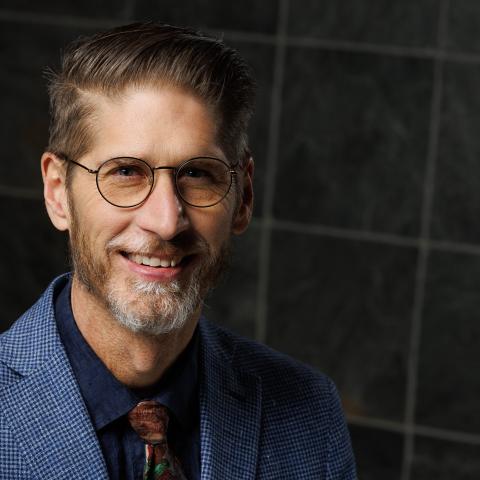Since 2019, new Deputy Director and Chief Operating Officer J. Alan Diehl, PhD, has been working with fellow leaders to develop research priorities and support new initiatives. Diehl, who is also Chair of the Department of Biochemistry in the School of Medicine, brings a strong understanding of basic research to his role. Most recently, he was Associate Director of Basic Science at Hollings Cancer Center at the Medical University of South Carolina, and prior to that, Director of the Cancer Cell Biology Program at the Abramson Family Cancer Research Institute at the University of Pennsylvania.
What is the main focus of your current research?
We try to understand the basic mechanisms of cancer development progression and translate that into new druggable pathways.
How has your research career evolved?
My interest has always been in what makes cells grow, the fundamental basis for cancer biology. Early on, I progressed from a biochemist to a cancer biologist. The fun questions for a biochemist include what are the molecular mechanisms of the regulation, cell division and cell fate decisions? When I started, the emphasis on bench-to-bedside wasn't as strong as it is now. A significant realization for me was when you're asking fundamental questions that impact our understanding of cancer or a tumor, they can be important for therapeutic intervention. Basic science plays a crucial role, and it is essential to define pathways that are required for cancer. My lab now has significant interest in glutamine. The different pathways and molecular framework of tumors make them particularly dependent on specific metabolites. And in many cases, the enzymes that make these metabolites enable cells to utilize these drugs.
What made you decide to come to Cleveland?
I would say two things: first, the overall leadership at Case Western Reserve University (CWRU) and the value it puts on scientific and medical excellence. It views both education service and research as significantly important. Second, the strength of the Cancer Center. I feel fortunate to be chair of a department with such a strong history in metabolism. As a cancer biologist, the importance of having a Cancer Center that is exceptional is equally important.
What do you feel is unique about our Cancer Center?
The programs here truly work. There is exceptional integration and teamwork. The Cancer Center provides value and the members provide value. There is authentic scientific depth and interaction throughout the membership. Also, it provides a cohesive critical network across the institutions - University Hospitals, Cleveland Clinic and CWRU.
What are three things you are watching in the science world?
Development of COVID vaccines:
Just the speed at which we can develop new treatments and get them to FDA approval is impressive. I think there should be a new appreciation for how this can be done.
Development of CDK46 inhibitors:
I've been working on cell cycle for 25 years. The concept that the cell cycle could be targeted for drug development became apparent in the early 1990s. The first lead compound was developed in 1999 and didn't get FDA approval until 2014. Now it is one of the hottest things, second to immune checkpoint. What took so long? First, they had to understand the scientific foundation of the molecules and how to use it. Then, they had to develop a clinical understanding of how to use these drugs. We now take a step back and see what science is telling us. We understand who would benefit, how to use it and what to look for.
Cancer metabolism:
I am also watching the different aspects of cancer without a metabolic influence, how tumors altered metabolism and where the therapeutics opportunities lie. We received one of the first cancer metabolism P01s back in 2003-04. It is amazing to see a rapid increase in interest in this area.
What are your future plans for the Cancer Center?
Translate ideas from the lab more rapidly:
For example, glutamine metabolism will impact how we treat certain cancers and it's a combination of understanding personalized medicine. If you know the genetics of a particular tumor, there is an opportunity to think about drug combinations.
Use basic science to inform therapy development:
Basic science can provide understanding of cell response and apply it to therapy development. When you turn one pathway off, the associated pathway reactions define the basis for resistance. You can begin to use scientific knowledge and think about the next opportunity for therapy. Can we treat it in a way that keeps the resistance from occurring? Or, at the very least, do we know the second line of treatment? You have to understand where the crosstalk lies.
Continue building team science:
We need to build more teams to take on bigger concepts, teams that maintain an individual's identity, but come together to build a research program that encompasses a much larger topic and larger impact. I am also focusing on enabling teams and supporting the development of new teams across the clinical, translational and basic platforms. That is the next step.
Expand how we handle data:
We are seeing how AI and machine learning can change the basic science process and have an impact clinically. Big data, genomics, getting beyond the description of the genomes, and how to use that data to formulate strong, hypothesis-driven scientific questions that tell us about the disease, and managing data is coordinating data science - those are huge opportunities. CWRU continues to lead in this area. We can move beyond simply thinking about bioinformatics analysis and start developing new tools and making data science a discipline that will inform the scientific process.
This story was featured in our 2020 Annual Report. Click here to read the full report.


